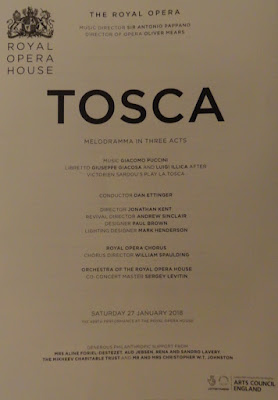Tive oportunidade de rever, mais uma
vez, a magnífica produção de Jonathan
Kent da Tosca de Puccini na Royal Opera House (textos anteriores aqui e aqui). O espectáculo é muito vistoso e bem
conseguido, mas um pouco escuro. Põe em evidência os conflitos principais de
cada personagem. No primeiro acto há o contraste entre a enorme estátua da
Virgem no centro do palco e a imagem semi-nua da Maria Madalena, pintada pelo
Cavaradossi numa parede lateral da igreja. No segundo, nos aposentos do
Scarpia, domina uma estátua de São Miguel, em contraste com a sua brutal
violência, que tortura o Cavaradossi e assedia sexualmente a Tosca. No acto
final aparece uma enorme asa sobre o Cavaradossi e a Tosca, como se estivessem
sob a vigilância de um anjo.
O maestro Dan Ettinger fez um bom trabalho com a
orquestra que revelou toda a intensidade dramática da partitura e respeitou
sempre os cantores.
Os cantores
solistas foram excelentes. O tenor Joseph Calleja foi o Cavaradossi. Voz
com excelente emissão e potência, mas com o timbre caprino que lhe é
característico. Interpretou a personagem com grande classe e esteve bem
em palco, embora parco na mobilidade.
A Floria Tosca
foi Angela Gheorghiu (já a tinha
ouvido neste papel nas duas récitas anteriores) e foi fabulosa. A voz mantém
todas as qualidades de sempre, agilidade vocal,
beleza tímbrica única, nunca desafina, mantém qualidade nas notas mais agudas,
pianíssimos fabulosos e extensão vocal impressionante. Em palco também foi
insuperável, a figura elegante ajuda muito. Na ária do 2º acto Vissi d’arte transbordou
emoção e tristeza numa interpretação superior. Ouviu uma enorme ovação, mas
fez-se aos aplausos. Tal como na via real, uma verdadeira prima donna que, no segundo acto,
aparece com tiara, numa reminiscência da Callas.
O barítono Gerald Finley foi um Scarpia também de grande qualidade. Tem uma bela voz, timbre muito
agradável, sempre sobre a orquestra e conseguiu ser a personagem pérfida e
cínica que o papel exige.
Dos cantores secundários salietaram-se Geremy White como
Sacristão, Aled Hall como Spoletta e,
sobretudo, Simon Shibambu como
Cesare Angelotti.
****
TOSCA,
Royal Opera House, London, January 2018
I had the
opportunity to see, once again, the magnificent production of Jonathan Kent of Puccini's Tosca at the Royal Opera House (previous texts here
and here). The performance is very showy and efficient, but a bit dark. It
highlights the main conflicts of each character. In the first act there is the
contrast between the huge statue of the Virgin in the center of the stage and
the semi-nude image of Mary Magdalene, painted by the Cavaradossi on a side
wall of the church. In the second act, in the headquarters of Scarpia, dominate
a statue of San Miguel, in contrast to his brutal violence, that tortures the
Cavaradossi and sexually assaults Tosca. In the final act appears a huge wing
over Cavaradossi and Tosca, as if under the vigilance of an angel.
Conductor Dan Ettinger did a good job with the
orchestra that highlighted all the dramatic intensity of the score, and always
respected the singers.
The soloist
singers were excellent. Tenor Joseph
Calleja was Cavaradossi. His voice has excellent emission and power, but
with a characteristic goat tone. He interpreted the character with great class
and was always well on stage, although meager in mobility.
Floria
Tosca was Angela Gheorghiu (I had
already heard her in the previous two perfromances) and she was fabulous. The
voice maintains all the qualities of ever, vocal agility, unique tonal beauty,
never out of tune, maintains quality in the top notes, fabulous pianissimi and impressive vocal
extension. On stage she was also unsurpassed, her elegant figure helps a lot.
In the aria of the 2nd act Vissi d'arte
she overflowed emotion and sadness in a superior interpretation. She heard a huge
ovation. As in real life, she is a true prima
donna who, in the second act, appears with a tiara, a reminiscent of
Callas.
Baritone Gerald Finley was a Scarpia also of
great quality. He has a beautiful voice, a very pleasant tone, always over the
orchestra, and has managed to be the perfidious and cynical character that the
role demands.
Of the
secondary roles Geremy White was fine
as Sacristan, Aled Hall as Spoletta
and, above all, Simon Shibambu as
Cesare Angelotti.
****















Sem comentários:
Enviar um comentário